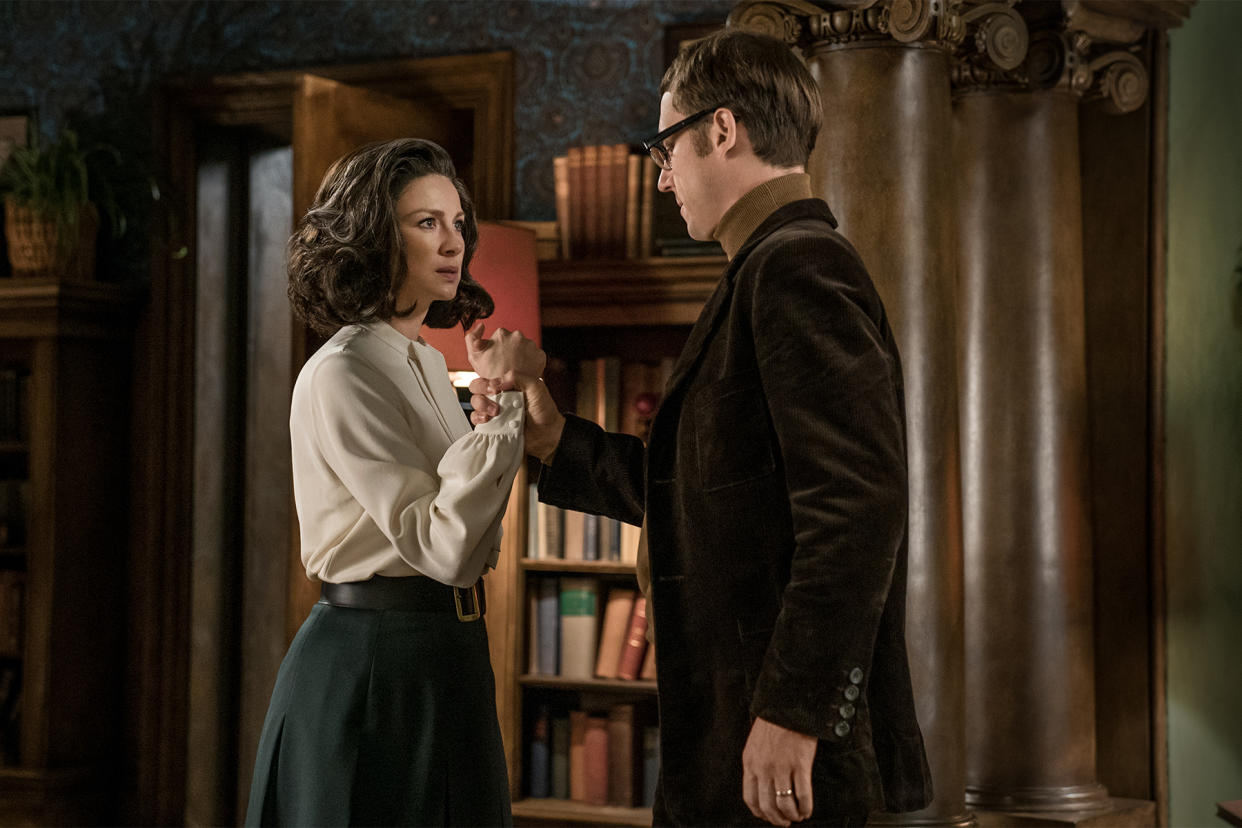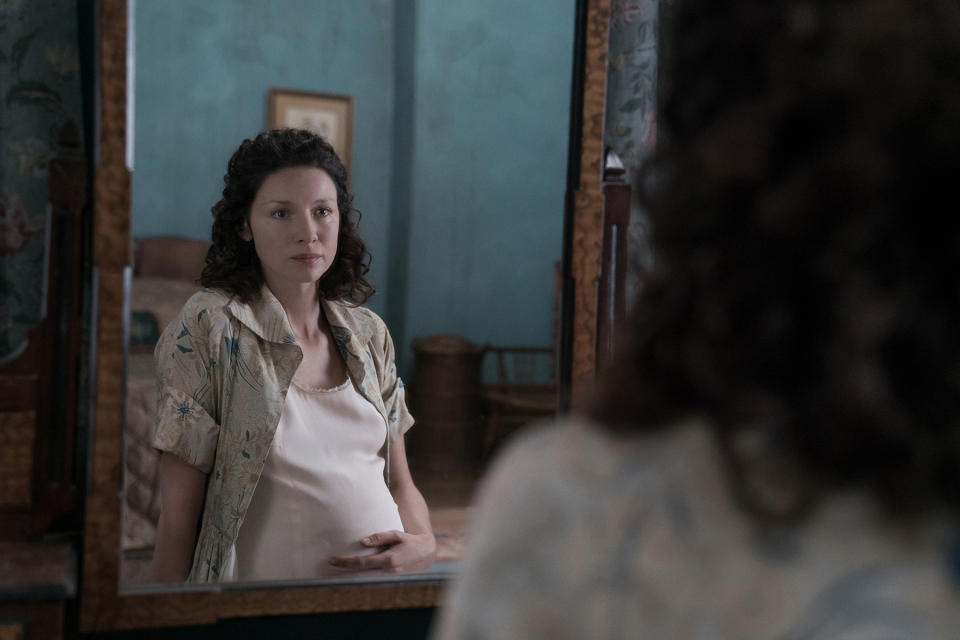'Outlander' Season 3: Caitriona Balfe defends Frank, talks Claire's new life

Tonight brings the long-awaited return of everyone’s favorite kisses-kilts-and-kills drama, and one thing’s for sure — there will be blood, as the battle of Culloden has finally arrived to darken the Highlanders’ historical doorstep.
As seen on Outlander at the end of Season 2, the Sassenach (Caitriona Balfe) is sitting this one out after Jamie sent his expecting Englishwoman back through the stones to save both her and the little one’s lives. Now she’ll face her own hell in 1940s Boston with her first (and far less virile) husband, Frank, an uncomfortable baby bump, a crappy stove, and a whole bunch of men who’d like to keep the bright, ballsy, and blunt time traveler in the kitchen.
“She is not where she wants to be, but she has something else, or I should say someone else really, to live for and to try to make this situation work,” Balfe says. “But she is grieving. She lost a huge part of her, and moving forward is not easy. But as we know by now, Claire has an incredible survival instinct.”
Balfe, on the other hand, welcomed the change of scenery and style. “It’s a lot less muddy in the 20th century, and don’t even get me started on the clothes,” she says. “If I could bring Claire’s 20th century wardrobe back to the 18th, I would be very happy.”
She also loved doing a deep dive into a complicated marriage with Frank (Tobias Menzies) and examining midcentury sexism from the perspective of a woman with big dreams who refuses to be kept down by the man…
Yahoo TV: Season 3 is based on the novel called Voyager. What do you think the theme of this year’s installment is? Whether physical or emotional, is Claire on a voyage?
Caitriona Balfe: This season is hard to talk about in some ways, because the beginning of the season is so different than the second half. I’d say these first six episodes belong to one world, and after that it’s something very different. In the first six episodes, we’re dealing with grief and loss. How do people carry on their daily lives after having experienced such a huge loss and tragedy? I think that’s something that the writers have gone quite in depth with. Jamie and Claire both had to say goodbye to their soulmate, but they handle this instance very differently. Jamie not only has lost Claire, but their child, his culture, and his people have been decimated as well. He’s a very broken man who in some ways is a ghost of himself. She’s lost Jamie, which is terrible, but she has this other life that she has to live for. She has to figure out a way to move forward. After having lost something so immensely important to her, it was interesting to see how she reconciles that within herself and finds a way to compartmentalize different parts of her so that she can get up the next day and build this quite successful and productive life for herself. I think that’s kind of a voyage. It’s all about transitions. Later there’s a more literal voyage. It’s going to be very different.
You know you guys left us hanging for an incredibly long time. Remind us where we left things.
We left off at the end of Season 2 in the ’60s, 1968, ’67/’68. Actually, I think ’66. Sorry. It’s hard to keep ahead of all of these dates. Time travel is so confusing. But Claire finds out that there’s a possibility that Jamie could still be alive in his time, but they’re 200 years apart. She realizes that he lived past Culloden, which is something that she thought was impossible. So we left her at this moment of hope and [with] this decision to find him, to go back.

Do we start in that moment? Where do we pick up with Claire?
Where we pick up in Season 3 is actually at the end of Episode 1 of Season 2. It’s back in the ’40s when Claire and Frank first arrive in Boston. She is very much in the throes of that immediate grief [thinking Jamie surely died in battle]. Everything’s depressed. She’s pregnant. But she knows she has to try to move forward for her daughter’s sake. She promised Frank that they would honestly try to start over.
How much did you and Tobias talk about and plan how to attack this very uncomfortable and sad time for these two people who used to be so close? It’s meaty stuff.
Tobias and I talked about it a lot, and we wanted Claire and Frank to just be on eggshells around each other trying to create this [image] that everything’s going to be OK and that this is a happy family. But, really, there’s a huge elephant in the room that neither of them wants to discuss. Anything could break that kind of artifice that they’ve created. She’s very fragile when we meet her in the beginning of Season 3.
Frank promised to raise the daughter as his own as long as Claire did not mention Jamie ever again. She agrees. Do you think they are capable of making it? Is she going to give it the old college try?
She’s never going to love anybody again the way she loved Jamie, and Brianna with her red hair is a very painful reminder of that, but she thinks he’s dead 200 years in the past. She is a realist too. And Frank has been a great husband to her. He was the center of her world before the stones. They were in love. As a widow, she’s living with the memory of Jamie always. But I wanted her to try, honestly try, and I wanted it to be a complicated thing where there’s always that possibility or that desire to live a happy life. Who wants to just sit in misery all the time? Nobody does. Circumstances force people to make decisions. If we were all in that position, would we all make the one that is the most admirable or heroic? Who knows? Probably not.
It has always been weird to me that people are so anti-Frank. He makes a huge sacrifice too. He says he will raise Brianna as his own and not ask questions. And we see him try to reach Claire and rekindle the spark when they first move to Boston. He gets her a real home, which she has always wanted, and starts over in a new country for her.
People love to pick sides and vilify Frank, but he never did anything wrong to her. She was the one thrown through time [who had] this experience that changed how she felt. The tragedy of the Claire and Frank story is that they’re both good people. They both, at different times, make overtures, but the timing is never right. They both just keep missing each other. Fundamentally, they give each other what the other needs only, and that’s why it doesn’t work. That’s tragic. We love to judge people and are very hard on people. A lot of the time, people are just doing the best that they can. We shouldn’t vilify them or judge them for that.
Viewers may have mixed feelings about Claire this season. Are you ready to be the one to blame occasionally?
In many ways, Claire comes out of it as the most unsympathetic character because Frank does make all of these overtures and is a great father. He’s taken this child that’s not his and completely decided that he’s going to raise this child as his own. It’s complicated, complex ground, and that’s so interesting to play. It’s so interesting to watch as well.
It’s also interesting to see her trying to make her way in this “modern” world. Maril [Davis, one of the show’s executive producers] and I talked a lot about how she was more free, valued, and fulfilled in the past than she is in the present, despite “progress” being made.
Funny how that works. But yes, she definitely has some trouble adjusting. Women were needed during the war to go work in the factories, and in Claire’s case as a nurse, and she craves that in her life. But that is not what she finds when she returns and the war is over and life goes on. It was really interesting to see that Claire almost had more agency or more freedom back in the 18th century. That was also a lot of fun to play with.
Did you like the change in fashion that filming the ’40s, ’50s and ’60s meant?
I love vintage clothes. I love the ’40s and the ’60s. The ’50s not as much, but still more comfortable than all those 18th century layers and corsets. It was great fun being able to try on all of these amazing things. Poor Terry [Dresbach, the show’s costume designer], because every second I was like, “Are we really going to use this? And if not, can I keep it?” I was promised a lot of things that have never materialized, so I’ll have to find out about that. It was interesting to play with what kind of woman Claire is. We never thought of her as being super-fashion. Terry always said, “I don’t want to do Vogue from the ’60s. You’re not the typical super-stylish la-de-da. I want to do a real woman from that era.” So we tried to figure out what a real woman like Claire would have worn every day. She has a great eye and she’s got great style, but her attention is not on the latest fashions. She’s smart, professional, and there’s a down-to-earth quality about what she wears.
Outlander airs Sundays at 8 p.m. on Starz.
Read more from Yahoo TV:
‘Outlander’: Sam Heughan, Caitriona Balfe on how Claire and Jamie will ‘fall in love again’
‘Top of the Lake: China Girl’ review: Elisabeth Moss in a crazy crime drama
Step on board ‘The Orville’ and go back to the future

